新概念第一册lesson67&68
新概念一册Lesson 67The weekend

am,are的过去式是were is的过去式was
were的否定weren’t
was 的否定 wasn’t
How
is Jimmy today? How are you? How is she/he? How are they?
How are you all keeping?问人怎么 样? 也可以说How are you doing? How is everything/it going? What’s going on? 那一般我们都怎么回答呢?
What is the date today?
Lesson 67 The weekend
Everyday English
1.
I want to change my life. 我想改变我的生活。
3. Love at first sight. 一见钟情。 4. I’m not that good! 我没有这么好。
1.How is Jimmy today?
He’s very well.
2.Was Jimmy at school last week?
No, he wasn’t.
3.When was he absent from school?
1.Was Jimmy absent from school ? 2.What day was Jimmy absent from school ? 3. Where and when are Mrs. Johnson going to spend there weekend?
spend的过去式spent花费,主语为人,一般与in/on .搭配。
spend,与cost 的区别
都是花费的意思,spend的主语是人,cost主
Lesson 67-68 The weekend(课件)-新概念英语第一册
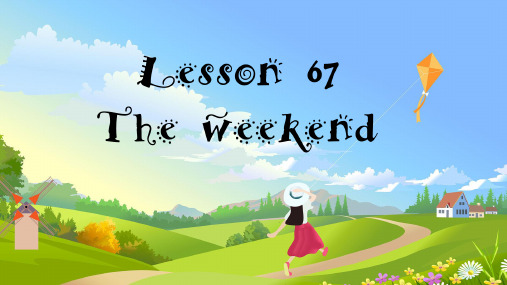
be动词的过去式
主语/时态 第一人称单数(I) 第三人称单数 (He, She, It)
现在时 am is
过去时 was
at the greengrocer’s
baker
/ˈbeɪkə/ n.
at the baker’s
at the greengrocer's (shop) at the grocer's at the hairdresser's
在蔬菜水果店 在杂货店 在理发店
at the doctor's (office) at my mother's (house)
Tuesday Friday weekend country baker grocer
Wednesday Saturday spend church keep greengrocer
Which one is appearing?
Saturday
absent country
weekend
greengrocer
Where were you on March 3rd? I was at...
Where were you on April 4th? I was...
Where were you on May 5th? I ...
Where was she on June 6th? She was at...
Friday /ˈfraɪdeɪ/
Saturday /ˈsætədeɪ/ Sunday /ˈsʌndeɪ/ weekend /ˌwiːkˈend/
新概念英语第一册第67-68课课件(共41张PPT)
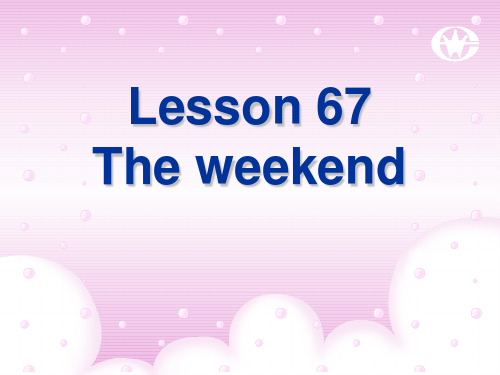
Aren't you lucky! ✲ 这句话是否定疑问句形式的感叹句,为的是加强语气。 尽管形式上是否定的,但却表示强有力的肯定。
Grammar
语法
一般过去时(simple past tense) :
过去发生的而现在已经结束的动作要用一般过去时。
基本用法:
1、常用来表示过去某一时间所发生的非持续性动作;
Lesson 67 The weekend
Discussion
What did you do on weekend ?
New Words
greengrocer 蔬菜水果零售商
absent
缺席的
keep
处于、保持
spend
度过
weekend 周末
country
乡村、国家
lucky
幸运的
New Words
5、We played(play的过去式) computer games together. 我们在一起玩了电脑游戏。
6、It ran(run的过去式) after a cat yesterday. 它昨天跑着追赶一只猫。
7、They made(make的过去式) a bookcase for Jim. 他们为Jim做了一个书架。
⑥Miss Zhang was ill 2 days ago. 张小姐前两天病了。
Miss Zhang wasn’t ill 2 days ago. 张小姐前两天没有生病。
一般过去时的句型构成形式:
一、含有系动词(be动词——am/is/are)的一般过去时形式:
✿疑问句: Was /Were + 主语 + …?
新概念英语第一册Lesson67_72语法及单词

新概念英语第一册Lesson67~72语法及单词新概念英语第一册Lesson67~68语法及单词语法Grammar in use一般过去时be( am/is/are)的过去式是was/were:在英文中,过去发生的而现在已经结束的动作要用一般过去时来表示。
be动词的过去式不规则,第1人称与第3人称单数用was,其他情况用were。
用be动词的一般现在时形式的一般疑问句及特殊疑问句迄今已介绍过,其过去时形式也一样,只是动词be在形式上变为was或were。
请看以下例句:Was Mrs.Johnson at the butcher’s?约翰逊夫人在肉店吗?No,sha wasn’t.她不在。
Were you at school or at church ou January 1st ?1月1号你在学校还是上教堂了?I wasn't at school on January 1 st .I was at church.我1月1号没上学。
我上教堂做礼拜了。
When was he absent from school ?他何时缺课了?He was absent on Monday,Tuesday,Wednesday and Thursday . 他周一、周二、周三和周四缺课了。
Where were you on Sunday ?周日你在哪儿?I was at church on Sunday.我周日在教堂做礼拜。
词汇学习Word study1. spend v.(1)花(时间等);度过:Where are the Johnsons going to spend the weekend ?约翰逊一家准备到哪儿去度这个周末?I hope that you wouldn’t spend so much time watching television.我希望你不要花这么多的时间看电视。
(2)用(钱),花费:I’m going to spend all my money this weekend !这个周末我要把我所有的钱都花掉!At present,more and more people have come to realize that more money should he spent on health and education.目前,越来越多的人已开始认识到:应该在健康和教育方面多花些钱。
新概念第一册Lesson67-68
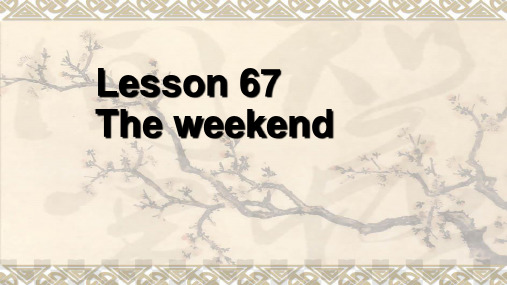
第二人称单数,复数 are were
(You)
How many days in a week?
There are seven days in a week. What are they?
Monday Tuesday Wednesday Thursday Friday Saturday Sunday
Yes, I was. / No, I wasn’t.
Were you at the office on Tuesday?
Yes, I was. / No, I wasn’t.
1.I was at school last Sunday.
Were you at school last Sunday? Yes, I was. / No, I wasn’t. 2.They were ten years old last year. Were they ten years old last year? Yes, they were. / No, they weren’t.
Was Mrs. Williams at the butcher’s last Tuesday? Yes, she was.
Was Mrs. Williams at the baker’s last Tuesday?
No, she wasn’t.
Was Mrs. Williams in the church last Thursday? Yes, she was.
主+was/were+其他
I am at home today.
I was at Jimmy’s home yesterday.
was
am
was
is
新概念Lesson-67-----The-weekend上课讲义

参加晚会。 反义词:present 出席,参加 Every employee must be present at the
meeting.每一位员工必须出席这个会议。
星期的表达
Monday Tuesday Wednesday Thursday Friday Saturday Sunday
weekday n. 平日(常指周一到周五的日子)
eg. My father is always busy in weekdays. 我爸爸平日总是很忙。
country
n. 乡村
country 1) n. 乡村,乡下 注意:country 当 “乡村,乡下”讲的时候,
前面必须用定冠词“the”;也可以说the countryside。
夫妇俩)
Now listen!
MRS.JOHNSON: Hello. Were you at the butcher’s?
MRS.WILLIAMS: Yes. I was. Were you at butcher’s, too?
MRS.JOHNSON: No, I wasn’t. I was at the greengrocer's. How's Jimmy today?
新概念英语 第一册
Hello! Everyone! I am Shannon.
Lesson 67 Tre you going to do at the weekend?
New Words and expressions 生词和短语
greengrocer absent Monday Tuesday Wednesday Thursday Keep
新概念英语第一册lesson67Theweekend

周末的重要性
放松身心:周末是放松身心的好时机,可以缓解工作压力和疲劳 家庭时光:周末是与家人共度时光的好机会,可以增进亲情和家庭关系 个人兴趣:周末可以用来追求个人兴趣和爱好,提升自己的技能和知识水平 社交活动:周末可以参加各种社交活动,结交新朋友,拓展人际关系
听录音模仿发 音和语调
练习听力和口 语表达
学习资源推荐
教材:新概念英语第一册lesson67Theweekend 视频教程:B站上有相关的教学视频,可以跟着老师学习 学习软件:扇贝单词、百词斩等APP上有新概念英语的单词和课文,可以随时随地学习 学习网站:新东方在线、沪江网校等网站上有新概念英语的教学课程,可以系统地学习
旅游观光:利用周末时间游览景点,了解当地文化,增强跨文化交流能力。
周末活动的实践案例分享
周末英语角:参加英语角活动,与母语人士交流,提高口语水平 英文电影赏析:观看适合英语初学者的英文电影,提高听力和语感 英语歌曲学习:学习简单的英文歌曲,培养英语学习兴趣 英语阅读:阅读适合英语初学者的英文故事或短篇小说,提高阅读能力
课文中的重点词汇和表达
重点词汇:周 末、公园、散 步、早晨、晚 上、享受、音 乐会、演奏、
钢琴、独奏
重点表达:在 公园散步,度 过一个愉快的 早晨和晚上; 参加音乐会, 欣赏演奏;形 容音乐会的气
氛和感受。
课文中的语法点
情态动词:本 课介绍了情态 动词"can"的用 法,表示能力
或可能性。
现在进行时: 课文中使用了 现在进行时, 表示正在进行 的动作或状态。
周末活动的种类
休闲娱乐活动: 看电影、听音乐、 玩游戏等
新概念英语第一册Lesson67 (共69张PPT)

I want to spend my holiday in the country this weekend.
我想这周末在乡下度假。
② v. 用(钱),花费 spend 时间/金钱 + on +sth.
Women spend a lot of money on clothes.女人都 花很多钱来买衣服
★ greengrocer [ˈɡri:nɡrəusə] n. 蔬菜水果零售商
在英文中,表示店铺、住宅、公共机构、公共
建筑物以及教堂的名字或某在人家蔬时菜,水果店
名词所有格后常不出现它所修饰的名词: at the greengrocer's
gБайду номын сангаасeengrocer greengrocer’s
/ˈɡri:nɡrəusə/
After nearly thirty years in the city, he’s still country.
他在城里住了将近三十年,可还是土气十足。
★ lucky adj. 幸运的
[ˈlʌki] ① adj. 有好运的,幸运的
She was lucky to get such a well-paid job. 她能得到这样一个报酬优厚的工作真幸运。
• Mrs.Johnson:Was he absent from school last week?
• Mrs.Williams:Yes,he was. He was absent on Mon,Tues, Wed,and thurday.
How are you all keeping?
★ 周一到周末
• Mrs.Johnson:No,I wasn’t. I was at at the greengrocer’s. How is Jimmy today?
新概念英语第一册第67课课件NCE1Lesson67(共47页)

绕口令游戏 • 3. I scream, you scream, we all scream for ice-cream! • 我叫喊,你叫喊,我们都喊着要冰 淇淋!
绕口令游戏
• 4. Betty beat a bit of butter to make a better butter. 贝蒂敲打一小块黄油要做一 块更好的奶油面。
• Spend v.度过 • Spend+n./pron度过
翻译
• We are gonging to spend several days at my mother’s. • I want to spend my holiday in the country this weekend.
• I hope that you wouldn’t spend so much time watching television.
Part one
• Something like apples, bananas, pears….
Part one
• We eat it in summer, it make us cool down
Part one
• The place with lots of water
Part one
Part three
• Can you count? • 猜数字游戏
Part four
• 绕口令游戏
绕口令游戏
• 1. Can you can a can as a canner can can a can? 你 能够像罐头工人一样装罐头 吗?
绕口令游戏
• 2. I wish to wish the wish you wish to wish, but if you wish the wish the witch wishes, I won't wish the wish you wish to wish. • 我希望梦想着你梦想中的梦想,但是如果 你梦想着女巫的梦想,我就不想梦想着你 梦想中的梦想。
新概念英语第一册课文翻译及学习笔记Lesson67
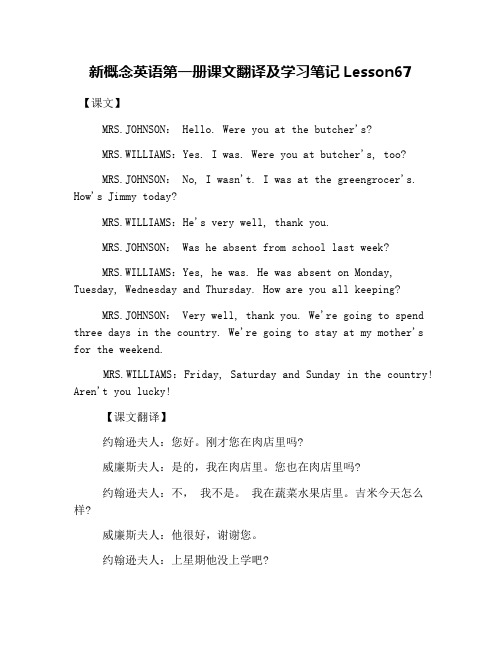
新概念英语第一册课文翻译及学习笔记Lesson67【课文】MRS.JOHNSON: Hello. Were you at the butcher's?MRS.WILLIAMS:Yes. I was. Were you at butcher's, too?MRS.JOHNSON: No, I wasn't. I was at the greengrocer's. How's Jimmy today?MRS.WILLIAMS:He's very well, thank you.MRS.JOHNSON: Was he absent from school last week?MRS.WILLIAMS:Yes, he was. He was absent on Monday, Tuesday, Wednesday and Thursday. How are you all keeping?MRS.JOHNSON: Very well, thank you. We're going to spend three days in the country. We're going to stay at my mother's for the weekend.MRS.WILLIAMS:Friday, Saturday and Sunday in the country! Aren't you lucky!【课文翻译】约翰逊夫人:您好。
刚才您在肉店里吗?威廉斯夫人:是的,我在肉店里。
您也在肉店里吗?约翰逊夫人:不,我不是。
我在蔬菜水果店里。
吉米今天怎么样?威廉斯夫人:他很好,谢谢您。
约翰逊夫人:上星期他没上学吧?威廉斯夫人:是的,他没上学。
他星期一、星期二、星期三和星期四没去上学。
你们身体都好吗?约翰逊夫人:很好,谢谢您。
我们打算到乡下去三天,在我母亲家度周末。
新概念英语第一册第67课ppt课件
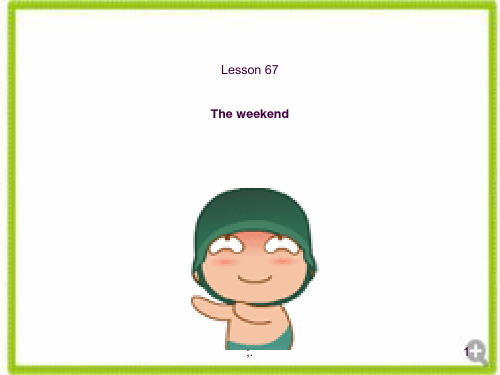
15
1 51
5
一般过去时的否定
They played in the garden on Sunday. They did not play in the garden on Sunday.
Tom watched TV this morning. Tom did not watch TV this morning.
Wednesday (Wed.)星期三
Thursday (Thu.) 星期四
Friday (Fri.)
星期五
Saturday (Sat.) 星期六
Sunday (Sun.) 星期日
3
New Words
church baker dairy grocer
教堂 面包师傅 乳品店 食品杂货商
4
一般过去时 • 意义:表示过去某个时间里发生的动作或存在的状态 • 结构:主语+动词过去式 • 标志性时间状语: • yesterday(短语):yesterday, • yesterday morning/afternoon/evening, • the day before yesterday , 前天 • last(短语): • last night昨天晚上/year去年/week上周/spring去年春天, • in +过去年份 • in 1990, 在1990年 • 时间段+ago(一段时间以前): • two days ago,three years ago, a week ago. • just now(刚才), this morning(今天早上),
13 1 3
• 你昨天在肉店吗?
Were +主语+表语?
• I was at the butcher’s yesterday.
新概念英语第一册Lesson 67&68课件
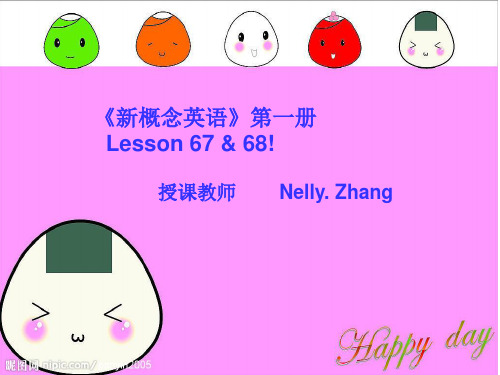
Sunday, January 1st Where was she on…? When was she at church?
at the baker’s
Friday, June 6th Where was she on…? When was she at the baker’s?
Pari work:Ask and answer!
When was Jimmy absent from shcool? He was absent from school on Monday, Tuesday,Wednesday and Thursday. How many days are the Johnsons going to say in the country? They are going to stay there for three days.
现在已经结束的动作。本课学习了带有be动词的一 般过去时。本时态常和有明确表示过去的时间连用。
1.肯定句结构:主语+was/were+...,第一, 第三人称的过去时(am/is)要变为was。 其余的都用were。 was/were 2. 一般疑问句:________提前,其余不 变。 肯定回答:Yes,主语+was/were. 否定回答:No, 主语+wasn't/weren't. not was/were 3.否定句在_________后加______,其余 不变。
Can you retell it?
Homework!
1. Retell the dialogue. 2. Finish the related exercise. 3. Learn the new words by heart.
新概念第一册Lesson67
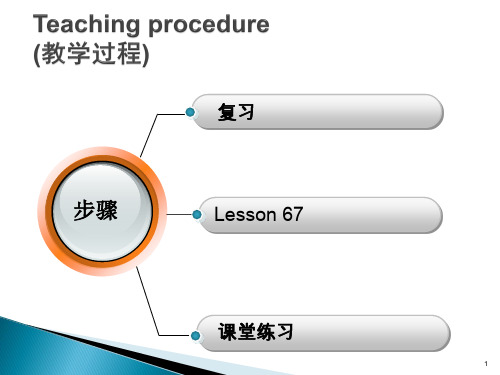
26
How are you? How do you do? How are you all keeping? How are you doing? How is everything going? How is it going?
那一般我们都怎么回答呢?
Not bad. Pretty well. Very well. Great. I’m OK. Just so so. How do you do! Fine. Not so good.
复习
步骤
Lesson 67
课堂练习
1
你今晚要去做什么? 我要去见一些朋友。 你不准太晚回家。 大门的钥匙 把钥匙给她 好吧 不客气 玩的开心
2
时间的表达方式: 1.顺读法 2.倒读法 a.past b.to 3.倒读法练习 1:05 1:10 1:15 1:20 1:30 1:40 1:45 1:50 1:58 1:59
33
在肉店里
Where were you on Wednesday, April 4th?
I was at the butcher’s on Wednesday, April 4th.
34
在理发店里
Where were you on Thursday, May 5th?
I was at the hairdresser’s on Thursday, May 5th.
29
I spend a lot of money on clothes. I spend a lot of money (in)buying clothes. eg. 学生每天都花时间写作业
新概念英语第一册课件Lesson67-68

joke
v. 开玩笑,戏弄,嘲弄 --My brother is always joking.我的兄弟经常开玩笑 --You must be joking.你在开玩笑吧 --I joked with him. 我和他开玩笑 --n. 玩笑
--He sometimes tells jokes. 他有时会说笑话。
not anything
not anybody
not anyone
3.一般情况下,形容词修饰名词时,通常形容词放在名词前面 a beautiful bird 形容词修饰不定代词时,通常形容词放在不定代词之后。 something good, anything wrong 回忆一下enough的用法 动词不定式可以跟在不定代词之后做定语 something to do, nothing to eat
--She is everything to me. 她是我的一切。
anything
pron. 任何东西
(用于疑问句,if从句)任何事 物 (用于否定句)任何东西都(不) --Did you say anything? 你说了些什么吗? --Has anything happened during my absence? 我不在时发生了什么事吗? --Do you want anything to drink? 你想喝点什么? --If there’s anything I can do for you, please tell me. 如果有什么我能帮你的,
1)以人或事为主语时,impossible 不能做表语与不定式连用,必须用少作形式主语。
--It is impossible for him to do it. 要他做那件事是不可能的。 --He is impossible to do it. (错误) 2)it 也可不做主语,而做宾语。 --Illness made it impossible for him to go. / Illness made him impossible to go.生病使他不能去。
新概念第一册 Lesson 67-68

否定疑问句
Aren’t you lucky! 你们真幸运啊! 否定疑问句形式的感叹句,为的是加强语气。尽管形式时否定的, 但表示强有力的肯定。
参考译文
约翰逊夫人:您好。刚才您在肉店里吗? 威廉斯夫人:是的,我在肉店里。您也在肉店里吗? 约翰逊夫人:不,我不是。我在蔬菜水果店里。吉米今天怎么样? 威廉斯夫人:他很好,谢谢您。 约翰逊夫人:上星期他没上学吧? 威廉斯夫人:是的,他没上学。他星期一/星期二/星期三和星期四没去上学。
keep
keep /kiːp/ v. (身体健康)处于(状况) keep doing sth (something) 持续做某事
spend
spend /spend/ v. 度过,花费 spend time(money)on sth spend time(money)in doing sth 花时间(钱)在某事上/做某事
一般过去时(simple past tense)表示过去某个时间里发生的动作或状态; 过去习惯性、经常性的动作、行为。 be动词的一般过去时: 肯定句:主语+be动词的过去式+表语 be动词的过去式不规则:am, is – was (过去式); are - were (过去式)
e.g. I was at the greengrocer’s. 否定句:主语+was(were) not +表语
你们身体都好吗? 约翰逊夫人:很好,谢谢您。我们打算到乡下去三天,在我母亲家度周末。 威廉斯夫人:星期五、星期六和星期日在乡下过!你们真幸运啊!
Role-play
MRS.JOHNSON: Hello. Were you ___ the butcher’s? MRS.WILLIAMS: Yes, I was. Were you at the butcher’s, too? MRS.JOHNSON: No, I wasn’t. I was at the ________. ____’s Jimmy today? MRS.WILLIAMS: He’s very ___, thank you. MRS.JOHNSON: Was he absent _____ school last week? MRS.WILLIAMS: Yes, he was. He was absent ___ Monday, Tuesday, Wednesday
- 1、下载文档前请自行甄别文档内容的完整性,平台不提供额外的编辑、内容补充、找答案等附加服务。
- 2、"仅部分预览"的文档,不可在线预览部分如存在完整性等问题,可反馈申请退款(可完整预览的文档不适用该条件!)。
- 3、如文档侵犯您的权益,请联系客服反馈,我们会尽快为您处理(人工客服工作时间:9:00-18:30)。
② v. 用(钱),花费
• spend 时间/金钱 + on +sth. 女人都花很多钱来买衣服。 Women spend a lot of money on clothes. 孩子们花费很多时间上网。 Children spend a lot of time on Internet.
• spend 时间/金钱 +(in) doing sth. • 我通常花一个小时做作业。 • I usually spend one hour in doing my homework.
• take 花时间,但是要用 It takes sb. some time to do sth. 我花了2个小时来完成我的作业。 It took me 2 hours to finish my homework. • pay [人做主语,人为某物付钱] pay for sth 我付给他新书的钱。 I paid him for the new book.
★country n. 乡村 ① n. 国家;国土;故乡 • 中国是个伟大的国家。 • China is a great country.
• ② n. 乡下,乡村 • country表示“农村”时,前面一定要加定冠词the。 ③ adj. 乡下的;乡村风味的 • I prefer country life to life in the city. 乡村生活与城市生活相比,我更喜欢乡村生活。
缺席,注意介词要用from
• Was he absent from school last week? • We are going to spend three days in the country.
spend的过去式spent花费,主语为人,一般与in/on .搭配。
spend,与cost 的区别
The weekend
Lesson 67
Revision
• • • • • •
Review 1.Make a sentence with must/mustn’t. translation: ①她什么时候必须回家? ②她必须在10点15分之前回家。 ③我们玩的很开心。
①When she get home? quarter past ten. ③ must We enjoy ourselves. ② She must get/come home at 10:15./a
辨析ke, pay
• cost 物做主语,表示物的售价 这本新书花了我20元。 This new book costs me 20 Yuan.
• afford 人作主语,支付得起,腾出时间 我可以买这本新书 I can afford this new book. 我可以腾出一天的时间给你。 I can afford one day for you.
特殊疑问句:特殊疑问词+一般疑问句
What did he do yesterday morning?
一般过去时的特征词(标志词)
• Mrs.Williams:He’s very well,thank you. • Mrs.Johnson:Was he absent from school last week? • Mrs.Williams:Yes,he was. • He was absent on Mon,Tues, • Wed,and thurday. • How are you all keeping?
Notes on the text 课文注释
Let's listen to the tape and answer!
1.Was Mrs.Johnson at the butcher’s?
No,she wasn’t.
2.Where was she?
She was at the greengrocer’s.
3.Who was at the butcher’s?
Mrs.Williams was.
3.How is Jimmy today?
He’s very well.
4.Was Jimmy at school last week?
No, he wasn’t.
5.When was he absent from school?
• 都是花费的意思,spend的主语是人,cost 主语是物,比如, • 我花了400RMB买了一辆新的自行车。 • I spend 400yuan in buying a new bike. • I spend 400yuan on the new bike. • The new bike costs me 400yuan.
• ----Were you at the butcher’s? • ----Yes, I was.
am,are的过去式是were is的过去式was
were的否定weren’t
was 的否定 wasn’t
• How is Jimmy today? • How are you? How is she/he? • How are they?
翻译: 这周五我将在我妈妈家住。 • I am going to stay at my mother's this Friday. 他们这周末要在她爷爷家住。 • They are going to stay at her grandfather's this weekend.
★absent adj. 缺席的 • be absent from 不在,缺席 be absent from school 缺课 be absent from work 旷工 她不喜欢上学,所以她经常缺课。 She doesn’t like school, so she is often absent from school.
★spend v. 度过 ① v. 花(时间等);度过 • spend + n./pron. 度过 我们要在我妈妈家呆几天。 We are going to spend several days at my mother’s.
我希望你不在看电视上浪费太多时间。 I hope that you wouldn’t spend so much time watching television. 这周末White一家要在哪过? Where are the Whites going to spend the weekend?
★greengrocer n. 蔬菜水果零售商 • 在英文中,表示店铺、住宅、公共机构、 公共建筑物以及教堂的名字或某人家时, 名词所有格后常不出现它所修饰的名词: at the greengrocer's 在蔬菜水果店 at the butcher's 在肉店里 at the dentist's 在牙医的诊所 at the hairdresser's 在理发店 at the stationer’s 在文具店 at my mother‘s 在我妈妈家
• 回答这种问题这种问题时用简略回答。 如果答语是肯定的,就用Yes 如果答语是否定的,就用No。 • -Don’t you know English? -Yes, I do. • -Aren’t you a student? - Yes,I am.
Grammar in use
一般过去时
一般过去时
2.反身代词
主格 I 宾格 me …的 my
名词性…的 反身代词
mine
myself
he
she it we they you
him
her it us them you
his
her its our their your
his
hers its ours
himself
herself itself ourselves
greengrocer absent Monday Tuesday Wednesday Thursday keep spend weekend Friday Saturday Sunday country lucky
n. 蔬菜水果零售商 adj. 缺席的 n. 星期一 n. 星期二 n. 星期三 n. 星期四 v. (身体健康)处于(状况) v. 度过 n. 周末 n. 星期五 n. 星期六 n. 星期日 n. 乡村 adj. 幸运的
★lucky adj. 幸运的 ① adj. 有好运的,幸运的 • 她能得到这样一个报酬优厚的工作真幸运。 • She was lucky to get such a well-paid job. • ② adj. 侥幸的,碰巧的 • 他并非真知道答案——那不过是个侥幸的 猜测。 • He didn’t really know the answer - it was just a lucky guess. • 他碰巧在这儿。 • It’s lucky he’s here.
Aren’t you lucky!
• 此为否定疑问句,表示双重肯定 表示说话者惊异的情绪、责难的口吻或赞 叹;也可表示说话者的某种建议、邀请、 请求或看法等。 • Haven’t I asked you? 难道我没问过你吗? • Aren’t you a student? • Can’t you wait a moment? 你就不能等一会儿吗?
theirselves yourselves
theirs
yours
New words and expressions
greengrocer greengrocer’s /ˈ ɡri:nɡrəusə/
butcher
/butʃə/
butcher’s
• • • • • • • • • • • • • •
• How are you all keeping?问人怎么 样? 也可以说How are you doing? • How is everything/it going? • What’s going on? 那一般我们都怎么回答呢?
